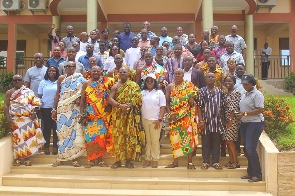 Executives and attendees captured in a photo
Executives and attendees captured in a photo
The Ministry of Roads and Highways has held a sensitization forum on the proposed Abidjan Lagos Corridor project for some chiefs, technocrats, and political heads of the Central Region to seek their support and cooperation.
Significantly, the Ministry wants the chiefs and people of the region to support the project with land and also preserve the designated areas from encroachers.
The meeting introduced the scope and design of the project to the stakeholders and sought their input before the actual construction starts tentatively in 2024.
The Abidjan Lagos Corridor is a 1,028-kilometre three-lane dual carriage highway spearheaded by ECOWAS, which seeks to further the Africa Continental Free Trade Area agreement.
The road, to be funded by the Africa Development Bank and other entities, will start from Abidjan in La Cote d’Ivoire, and pass through major towns and cities in Ghana, Togo, and Benin to Lagos in Nigeria.
Ghana’s stretch of the project will be an entirely new 576-kilometer stretch, running parallel to the existing main highways from Elubo in the Western Region to Akanu in Dzodze in the Volta Region.
In the Central Region, the road will pass through 10 districts including Komenda-Edina-Eguafo-Abrem, Abura-Asebu-Kwamankese, Ekumfi, Ajumako-Enyan-Essiam, and Awutu Senya.
Gomoa West, Gomoa East, Gomoa Central Districts, Mfantseman Municipality, and the Cape Coast Metropolis will also be affected by the project.
Mrs. Rita Ohene Sarfo, Director of the project in Ghana, indicated that government would embark on the compulsory acquisition of lands for the project and urged the chiefs to give their maximum cooperation.
She assured me that even though the project might affect farms, forests, and homes, they would work to mitigate the environmental and social costs.
She explained that the decision to construct an entirely new road was informed by social, economic, environmental, technical, and financial considerations.
“We are going by a new alignment because it is going to be a three-lane dual carriageway and if we go by the existing alignment, we are going to wipe out nearly all the communities along the coastal corridor,” she said.
Mrs. Sarfo, who is also the Director of Policy, Planning, and Budgeting at the Ministry, touting the commercial viability of the project, said it formed part of the African Union’s agenda to develop the continent through trade and transit facilitation.
The project, she noted carried the great economic potential for Ghana and the Central Region, for which reason the people must support it.
Touching on the scope of the road, she said there would be no pedestrian crossing but there would be interchanges and tunnels to connect to them.
She added that they would establish joint border posts to improve trade facilitation.
She said a lot of people had expressed interest in the project, adding that “I am very hopeful that in 2024 we may commence certain sections of the project.”
Mrs. Sarfo, an Engineer, assured that the Ministry and its partners would continue to engage the communities until they got them to appreciate and accept the project.
Reverend Emmanuel Ransford Kwesi Nyarko, the District Chief Executive (DCE) for Ajumako-Enyan-Essiam and Dean of Metropolitan, Municipal, and District Chief Executives in the region, expressed the support of his colleagues for the project.
He said that even though there might be some social cost, the eventual benefit was enormous.
“We must look at the overall good. Ghana has more than 50 percent of the corridor and it stands that Ghana will be the biggest beneficiary as far as this project is concerned.
“And so irrespective of the social cost, we think that it is a worthy project that we have to push through,” he added.
For his part, Mr. Kingsley Agyei Boahene, the Chief Director of the Central Regional Coordinating Council, Commended Ecowas, and the technical teams for pursuing the project will facilitate trade and transport.